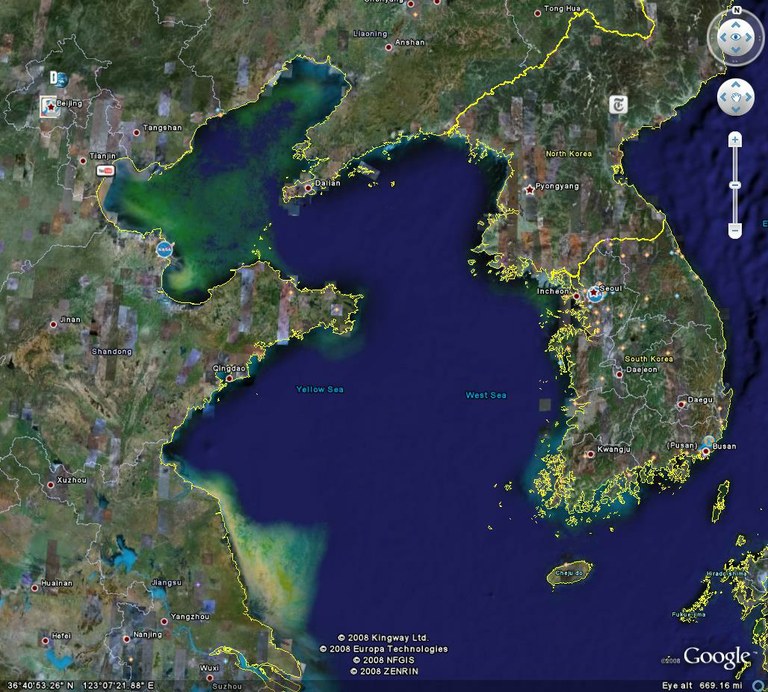About Yellow Sea
The objective of the project is:
The objective of the project is:
Ecosystem-based, environmentally-sustainable management and use of the YSLME and its watershed by reducing development stress and promoting sustainable exploitation of the ecosystem from a densely populated, heavily urbanized, and industrialized semi-enclosed shelf sea.
The focus of the YSLME project on sustainable fisheries management and reducing stress to the ecosystem provides an opportunity for exploring how this GEF project can further national and regional commitments to certain international conventions and agreements, such as the United Nations Convention on the Law of the Sea (UNCLOS), the FAO Code of Conduct for Responsible Fisheries, and the Global Programme of Action for the Protection of the Marine Environment from Land – based Activities (GPA).
In order to achieve the objectives, the purpose of this project will be to prepare a Transboundary Diagnostic Analysis (TDA), National Action Plans (NAPs), and a regional Strategic Action Programme (SAP) for the Yellow Sea. This project will also initiate and facilitate the implementation of the SAP. The SAP will consist of a series of legal, policy and institutional reforms and investments to address the priority transboundary issues identified in the TDA/SAP/NAP formulation process.
The preparation of the TDA will be based on the preliminary TDA (PTDA) undertaken during the preparatory phase of this project. The TDA will be used as a basis for focusing on the threats, their root causes and the sectoral activities that endanger the critical ecosystem of the YSLME to implement selected components of the SAP, as appropriate. The SAP will identify priority actions to be taken by the participating countries to restore and preserve the YSLME. The SAP will adopt a comprehensive approach and will address land and sea-based sources of marine pollution, degradation of critical habitats and over-fishing.

The long-term objective of the project is:
ECOSYSTEM-BASED, ENVIRONMENTALLY-SUSTAINABLE MANAGEMENT AND USE OF THE YSLME AND ITS WATERSHED: REDUCING DEVELOPMENT STRESS AND PROMOTING SUSTAINABLE DEVELOPMENT OF THE ECOSYSTEM FROM A DENSELY POPULATED, HEAVILY URBANIZED, AND INDUSTRIALIZED SEMI-ENCLOSED SHELF SEA.
The medium-term objectives of the project are:
(i) Enhancing national capacities in protection of marine environment and sustainable use of marine and coastal resources, through preparation and development of the Transboundary Diagnostic Analysis (TDA), Strategic Action Programmes (SAP), and Implementation of SAP;
(ii) Strengthening regional co-operation in marine environment protection and management through establishment of regional mechanisms established during the implementation of the project activities in the Yellow Sea, and co-operative spirit enhanced by the project, and
(iii) Facilitating cross-sector co-operation and co-ordination of relevant national institutions dealing with marine environmental management, through the Inter-ministry Committee established by the project for the Yellow Sea large marine ecosystem.
Major Perceived Water-related Environmental Issues and Problems
The identification of the major perceived issues is the first step in the TDA process and it will provide the justification for the in-depth analyses. A distinction will be made between national and regional issues and then will be ranked according relative significance from the national, regional and global perspectives. As these distinctions become clearer, the emphasis in the TDA will gradually shift to those issues that are clearly demonstrated to be more significant at a regional or global level and to those issues that are characterized as transboundary. The significance of the perceived issues and problems will be substantiated on environmental, economic, social, and cultural grounds. The economic costs and losses (consequences/implications), in the broad sense, of a perceived issue such as "degradation of natural landscapes" could include loss of value for tourism. The scale of economic losses that are implied by not addressing the issue can be used to justify intervention at national and/or regional levels depending on whether the issue is national or transboundary in nature.
The project was formulated with international conventions and practices in mind, including the United Nations Convention on the Law of the Sea (UNCLOS), the FAO Code of Conduct for Responsible Fisheries (CCRF), and the Global Programme of Action for the Protection of the Marine Environment from Land-based Activities (GPA). Details of mechanisms of interaction and relationships with the GPA, CCRF, and UNCLOS are provided in the Project Document.
YSLME Project Brief Document (May, 1994).
Want to know more about TDA? Click here.
Document Actions






